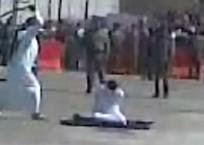Police in riot gears in the capital Dhaka broke up a demonstration by energy activists on Thursday midday demanding postponement of contracts with foreign companies for power generation and coal exploration.
Police charged batons and fired tear gas shells to disperse the demonstrators who tried to lay siege to the Ministry of Energy and Mineral Resource to press for termination of Phulbari Coal Project contract with GCM Resources, a London-based resource exploration and development company.
Activists’ spokesperson Prof. Anu Mohammad said at least 35 people of the network National Committee to Protect Oil, Gas, Mineral Resources, Power and Ports were injured as police clubbed the activists marching towards the Ministry of Energy & Mineral Resources.
Among the injured includes Engr. Sheikh Mohammad Shahidullah and Prof. Rehnuma Khanam of the committee.
Earlier, police barricaded the entrance with barbed wire fences to hold back the angry activists.
The energy activist's network of leftists, professional and civil society members after holding a rally in front of National Press Club at the city centre marched towards the Bangladesh Secretariat, where most of the ministries are housed.
Spontaneously the network announced that it would observe countrywide rallies on Jan. 2 in protest of Thursday’s police action.
Bangladesh is in the midst of a severe and worsening energy crisis. Less than half of the country’s 150 million people have access to electricity and those that do have access suffer from frequent power cuts.
Lack of available power is a barrier to the development of industry and also impedes agricultural production.
Presently the country’s power generation is based on natural gas. Therefore coal fired power stations proposed by India could reduce the power shortage significantly.
Saleem Samad, an Ashoka Fellow is an award winning investigative journalist based in Bangladesh. He specializes on Islamic terrorism, forced migration, good governance and elective democracy. He has recently returned from exile from Canada after return of democracy. He could be reached at saleemsamad@hotmail.com


























